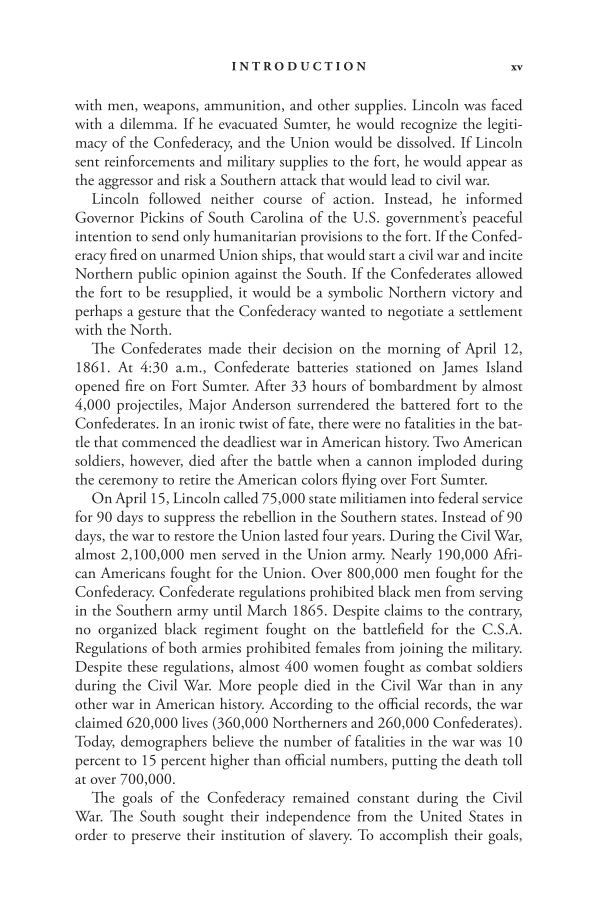I n tr o d u cti o n xv with men, weapons, ammunition, and other supplies. Lincoln was faced with a dilemma. If he evacuated Sumter, he would recognize the legiti- macy of the Confederacy, and the Union would be dissolved. If Lincoln sent reinforcements and military supplies to the fort, he would appear as the aggressor and risk a Southern attack that would lead to civil war. Lincoln followed neither course of action. Instead, he informed Governor Pickins of South Carolina of the U.S. government’s peaceful intention to send only humanitarian provisions to the fort. If the Confed- eracy fired on unarmed Union ships, that would start a civil war and incite Northern public opinion against the South. If the Confederates allowed the fort to be resupplied, it would be a symbolic Northern victory and perhaps a gesture that the Confederacy wanted to negotiate a settlement with the North. The Confederates made their decision on the morning of April 12, 1861. At 4:30 a.m., Confederate batteries stationed on James Island opened fire on Fort Sumter. After 33 hours of bombardment by almost 4,000 projectiles, Major Anderson surrendered the battered fort to the Confederates. In an ironic twist of fate, there were no fatalities in the bat- tle that commenced the deadliest war in American history. Two American soldiers, however, died after the battle when a cannon imploded during the ceremony to retire the American colors flying over Fort Sumter. On April 15, Lincoln called 75,000 state militiamen into federal service for 90 days to suppress the rebellion in the Southern states. Instead of 90 days, the war to restore the Union lasted four years. During the Civil War, almost 2,100,000 men served in the Union army. Nearly 190,000 Afri- can Americans fought for the Union. Over 800,000 men fought for the Confederacy. Confederate regulations prohibited black men from serving in the Southern army until March 1865. Despite claims to the contrary, no organized black regiment fought on the battlefield for the C.S.A. Regulations of both armies prohibited females from joining the military. Despite these regulations, almost 400 women fought as combat soldiers during the Civil War. More people died in the Civil War than in any other war in American history. According to the official records, the war claimed 620,000 lives (360,000 Northerners and 260,000 Confederates). Today, demographers believe the number of fatalities in the war was 10 percent to 15 percent higher than official numbers, putting the death toll at over 700,000. The goals of the Confederacy remained constant during the Civil War. The South sought their independence from the United States in order to preserve their institution of slavery. To accomplish their goals,
Document Details My Account Print multiple pages
Print
You have printed 0 times in the last 24 hours.
Your print count will reset on at .
You may print 0 more time(s) before then.
You may print a maximum of 0 pages at a time.






















































































































































































































































